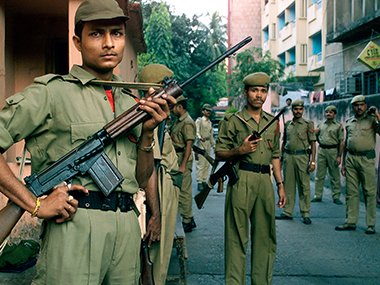An ethnic Assamese Muslim organisation has raised concerns over the quality of education being imparted in madrasas in the state’s river islands, with dominant immigrant Muslim population demanding that the government step in to regulate these unregistered religious schools. The Goriya Moria Desi Jatiya Parishad’s demand comes at a time when controversy rages over ‘Miya Poetry’, a relatively new poetic genre being practised by Muslims of Bangladeshi origin who write in their native dialects in a state where language and identity are sensitive issues. ‘Miya’ is a derogatory term for migrant Muslims in Assam. The Parishad, which has often spoken against the rise of unregulated madrasas, suspects that a radical brand of Islam is being taught in these schools. “Madrasas, which claim to provide Islamic education to the poor immigrant Muslim population, have mushroomed in big numbers in Assam’s river islands. Many of these madrasas are not even registered with the government and hardly anything is known about the quality and kind of education. The government of Assam should step in to monitor the course being taught there,” said Goriya Moriya Desi Jatiya Parishad working president Nurul Haque. [caption id=“attachment_4638251” align=“alignleft” width=“380”] Representational image. Reuters[/caption] Haque said fundamentalism didn’t necessarily mean jihadist activities. “It also implies divisions in the society along religious lines,” he said. “Religious education is meant to create brotherhood. If fundamentalist groups are getting to control these institutes, then it can cause division in the society.” Bangladeshi migrants, who inhabit remote river islands and also areas along the border, share a testy relationship with indigenous ethnic groups and tribes. While the migrants allege discrimination at the hands of the local population, they, in turn, are accused of land grabbing. The ‘Miya Poetry’ is also being seen as an attempt at asserting identity, which has not gone down well with many Assamese speakers. Illegal immigration has been a concern in Assam. The Centre is in the process of updating the National Register of Citizens to identify illegal immigrants. The final list of citizens is to be published on 31 July. Assam also has a sizable population of Assamese Muslims, mostly known to be the followers of Sufi saint Azaan Peer. Most of the Goriya, Moria and Desi ethnic groups identify themselves with the local liberal Sufi Islamic tradition. The Parishad had taken up the demand for monitoring madrasas with the home ministry five years ago as well. “Soon after Narendra Modi was elected prime minister for the first time, we met the then home minister Rajnath Singh and appealed him to devise a system to monitor the activities of un-regulated madrasas,” Haque said. Monitoring should include registration and modernisation of madrasa curriculum, he said. In 2018, the state government passed The Assam Madrasa Education (Provincialisation of Services of Employees and Re-Organisation of Madrasa Educational Institutions) Bill. The bill would ensure that madrasas conform to the prevailing statutory norms and standards and also restrict growth of such venture madrasa educational institutions, state’s health minister Himanta Biswa Sarma had said, explaining the need for such legislation. Haque claims the law has failed to check unregulated madrasas and they continue to mushroom in the state. A source in the Assam education department contested Haque’s claims. Around 700 madrasas were following government norms, the sources told Firstpost on condition of anonymity. “We are not aware if there are any more such institutes functioning in Assam,” the source said. A section of clergy is resisting modernisation of the religious schools. Certainly, some madrasas were regulated by the government but not all can be controlled, Maulana Fazlul Karim Qasimi, who is Jamiyat Ulama’s Assam secretary, told Firstpost. “There are many madrasas which are established by the mosques to teach the Quran Sharif and Hadith and are run by the contribution of the local population. The government has no right to interfere in their activities and no Muslim will ever tolerate government interference in such madrasas,” he said. Qasimi, however, said if the government had proof of a madrasa’s anti-social activities, then it should take immediate action. “If a madrasa is proven to be errant, then it is shameful for the Muslim community. There can be no hindrance in government taking appropriate legal action against them, but such an action has to be on the basis of evidence and not hearsay,” he said. The debate over madrasas comes at a time when a ‘Miya poem’, translated into Assamese and English, alleged that immigrant Muslim women were gangraped in Assam. At a press conference in Bongaigaon district, the Parishad said it was a blatant lie spread to defame the Assamese community. The organisation also filed a First Information Report against few persons for promoting the poem that was widely shared on social media.
An ethnic Assamese Muslim organisation has raised concerns over the quality of education being imparted in madrasas.
Advertisement
End of Article


)

)
)
)
)
)
)
)
)



